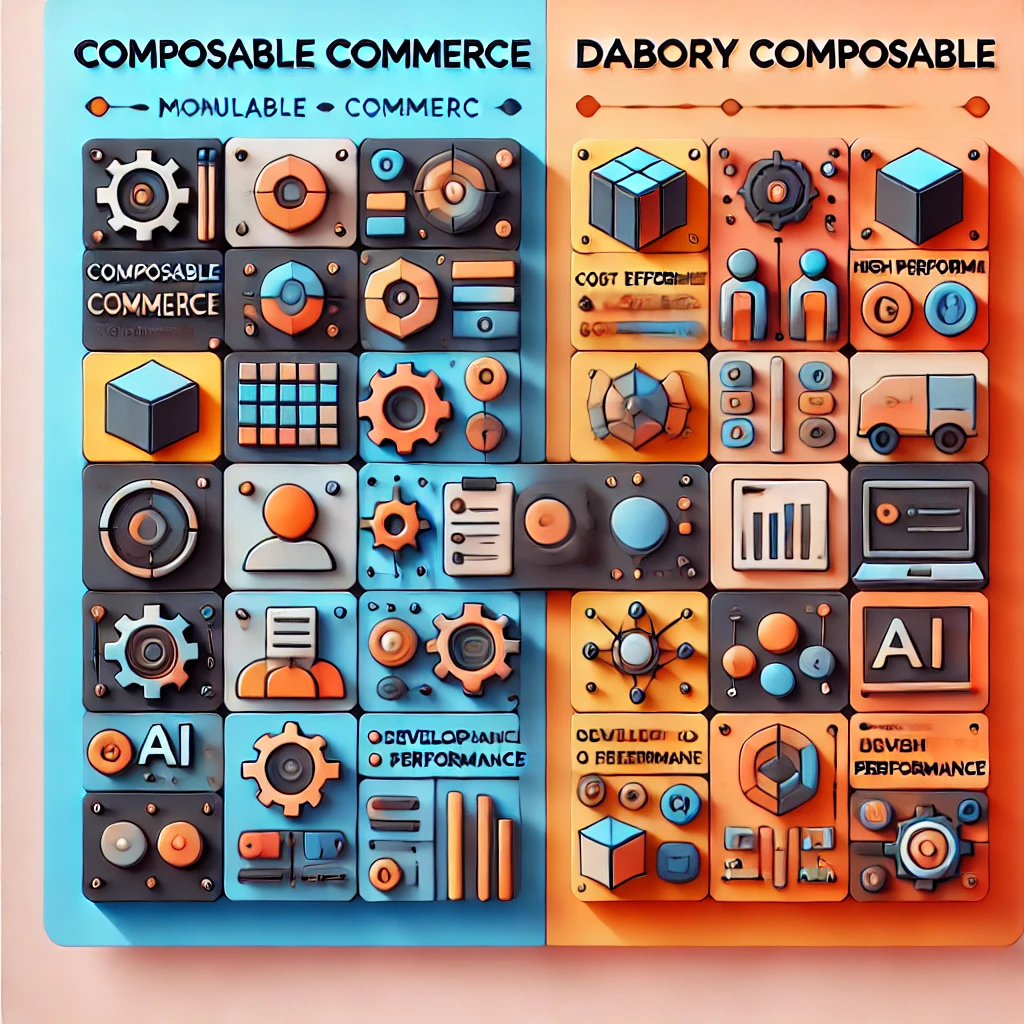Dabory Composable (DC) and Composable Commerce both offer modular, scalable solutions aimed at building flexible e-commerce systems. However, they differ in approach and functionality, with DC providing unique advantages that deliver key differentiators.
Similarities
-
Modular Architecture
- Both DC and Composable Commerce use a modular approach, combining components such as CMS, ERP, CRM, and e-Shop to build systems.
- Advantage: Allows flexible customization and scalability based on business needs.
-
Scalability
- Both platforms are designed to scale from small implementations to enterprise-grade functionality as businesses grow.
-
Customization Capabilities
- Each solution provides APIs and tools that enable developers to tailor platforms to specific business requirements.
-
Optimized Solution Utilization
- Both platforms allow the use of the best tools for specific tasks such as payment processing, content management, and customer interaction.
Key Differences and DC Advantages
| Feature |
Composable Commerce |
Dabory Composable (DC) |
DC Advantage |
| Integrated Platform |
Requires integration of multiple third-party services |
Provides pre-integrated modules (e-Shop, ERP, CMS, CRM, POS) |
Simplifies installation and minimizes integration issues |
| Cost Structure |
Subscription-based with third-party tools and platforms |
Open-source, self-hosted, no subscription fees |
Reduces costs and maintains long-term data ownership and control |
| Performance Optimization |
Performance varies based on third-party optimization |
Built-in Query Turbo and Cache Turbo technologies |
Provides fast page rendering and high reliability |
| AI Integration |
Requires additional tools for AI implementation |
AI-friendly schema (JSON-LD) and built-in AI agents |
Enables search optimization, recommendations, and automation out-of-the-box |
| Developer Accessibility |
Requires high technical proficiency for multiple service integrations |
Provides pre-built templates, AI pair programming, and detailed documentation |
Lowers entry barriers for beginners and supports rapid project completion |
| Data Ownership |
Data is distributed across multiple services, creating security concerns |
Centralized data management with full ownership |
Enhances control over security and compliance |
| Gateway API |
Requires custom integration for enterprise-grade systems |
Offers fully extensible Gateway API |
Simplifies the addition of custom or third-party APIs |
DC's Unique Strengths
-
Integrated Pre-Built Platform
- While Composable Commerce requires combining tools from various vendors, DC provides pre-integrated modules (ERP, CRM, POS, etc.), reducing setup time and complexity while supporting additional customization.
-
Cost Efficiency
- DC eliminates subscription fees with its open-source, self-hosted model, making it cost-effective for small businesses while offering complete control over data and infrastructure.
-
AI-Based Features
- DC integrates **AI-friendly schema (JSON-LD)** and built-in AI agents to support search engine optimization, product recommendations, and automation, positioning it as a leader in AI-driven e-commerce.
-
High Performance
- With Query Turbo and Cache Turbo technologies, DC outperforms Composable Commerce in speed and reliability, providing an exceptional user experience even under heavy traffic.
-
Developer-Friendly Environment
- DC simplifies development with pre-built templates, AI tools, and detailed documentation, making it suitable for both beginners and experienced developers.
-
Security and Data Ownership
- DC centrally manages data and ensures complete ownership, enhancing security and regulatory compliance.
Conclusion
While both DC and Composable Commerce offer modular and scalable solutions, DC delivers superior flexibility and functionality through its integrated platform, cost efficiency, AI integration, high performance, and developer-friendly features. DC goes beyond a simple e-commerce system, making it the ideal platform for businesses seeking a future-oriented and scalable solution.

댓글쓰기